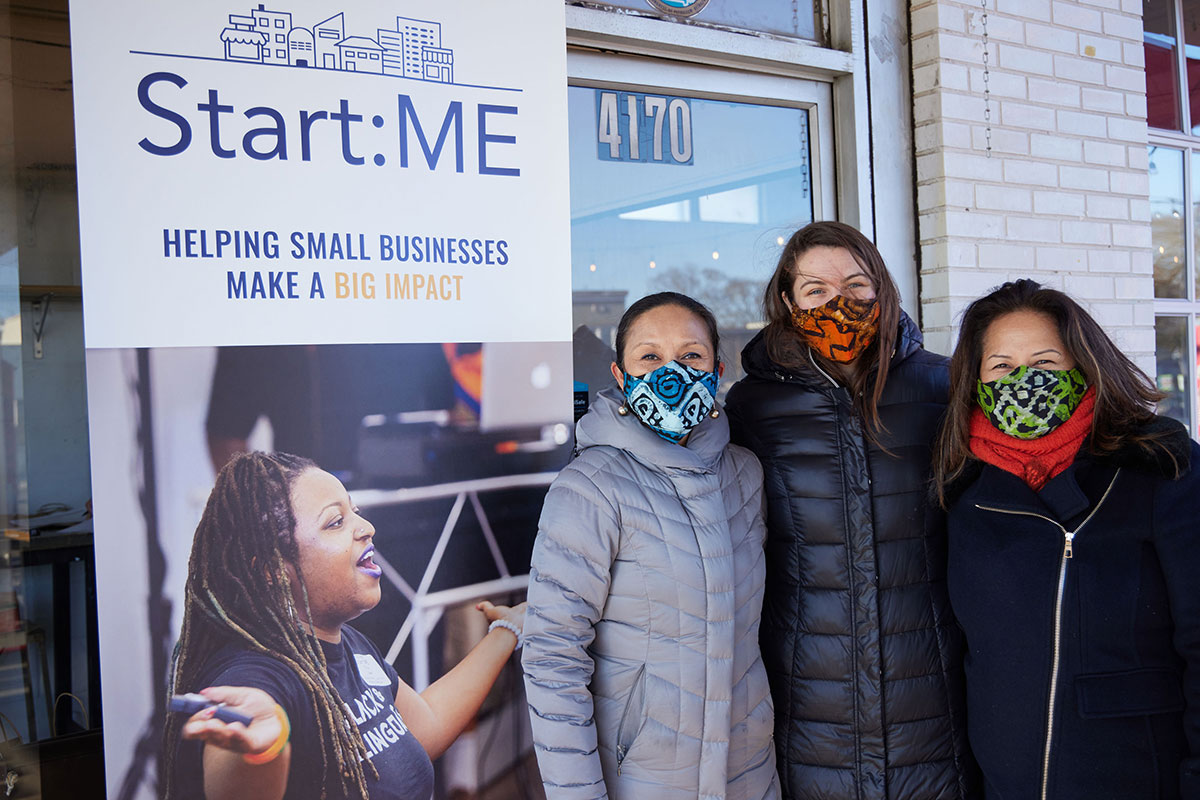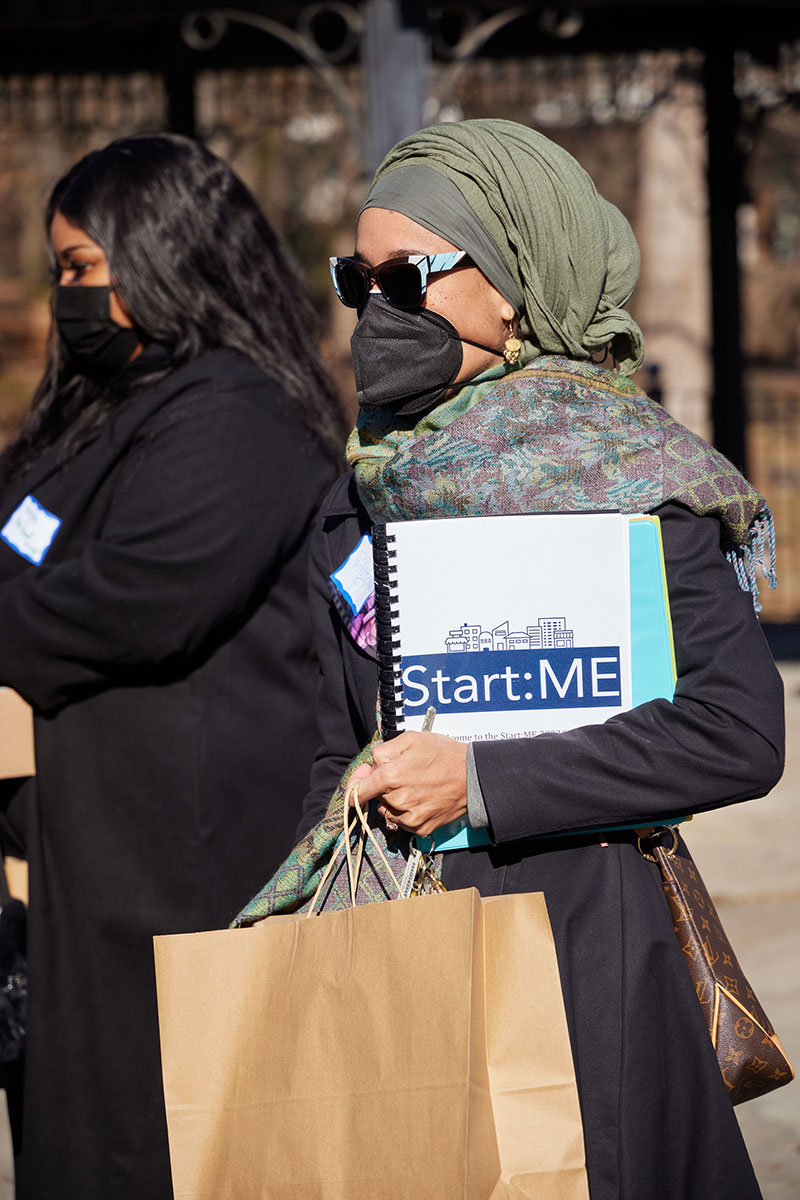High-tech entrepreneurs may be the darlings of the business press, but the backbone of the U.S. economy is small, local businesses that meet the needs of their neighbors. In fact, startups with zero to 10 employees make up 96 percent of all U.S. businesses, according to the Small Business and Entrepreneurship Council.
Most of these microbusinesses launch with less than $50,000. To that end, Start:ME — the business accelerator housed in The Roberto C. Goizueta Business and Society Institute — welcomed its newest cohort of startups at a kickoff event on Jan. 29. Start:ME partners with organizations in three Atlanta communities: Clarkston, East Lake and Southside.
More than 360 businesses and their founders have taken part in the three-month accelerated training program since 2013. Venture-building tools and connections position them to grow their offerings of services and products and help nurture their local neighborhoods in the process.
“The stories we hear of successful startups in the U.S. fit a very narrow profile,” says Erin Igleheart, program director. “They’re often high-growth tech businesses run by white men who have resources and family connections. That is part of the entrepreneurial ecosystem, but it really misses the vast majority of the businesses started in this country each year.”
Indeed, of the 57 ventures in the current cohort of founders — chosen from among more than 250 applicants — 72% are women, 82% are people of color and 21% are immigrants. As a group, they employ 25 people in addition to the founders and generate $660,000 in annual revenue.

Forty-five percent of new businesses in the U.S. close within five years, according to the Bureau of Labor Statistics. But Start:ME entrepreneurs are especially resilient. Sixty-eight percent of alumni ventures are actively operating, creating 500 jobs, operating 46 stores and offices around Atlanta, and earning $10.5 million per year. Many have gone on to start second (third or even fourth) companies, broadening their local impact.
“Their passion is really strong,” Igleheart says. “They bring so much enthusiasm to what they do. It’s enlightening to work with entrepreneurs to build stronger, more vibrant communities.”
Forty-four percent of current Start:ME participants have been in business for at least three years; an equal percentage have been in business for less than two. Nearly 80% of the startups are in five industries: food and beverage; health and beauty; arts and culture; professional services; and health care and social assistance. Their goals vary, from aspiring to take these business ventures from part-time to full-time, to hiring a large team, to opening a local storefront, to scaling to sell.
Many of the businesses grow out of founder pain points
“We’ve really seen a shift in that even in the last five years,” Igleheart says. “Local businesses start out serving their own needs and frustrations, then realize there’s a larger need.”
For example, companies in Start:ME over the years have built businesses providing health and beauty goods for people of color — from color-matched makeup to hard-to-find salon services and products for people with curly or kinky hair. It’s a market ripe with opportunity.
“This has not historically been a well-served market by large retailers, but it’s a multi-billion-dollar industry,” she says.
Some in the current cohort offer mobile bicycle repair services, luxury floral and gift delivery, and urban agricultural products such as liquid compost and garden beds. One venture bakes bread with ingredients sourced locally, closing the loop on the local food economy.
Founders are “deeply committed, hardworking people,” Igleheart says. “They are pursuing work that is deeply personal.”
It can be lonely work at times, she adds — something Start:ME was designed to alleviate.
Start:ME’s signature: building a supportive ecosystem for founders
“What’s so exciting about bringing together a cohort is that while they’re all running very different businesses, they form this really supportive ecosystem,” Igleheart says. “Instead of going on this journey by themselves, they go on it together. They’ve got peer entrepreneurs in and around their community and then across Metro Atlanta.”
Meetings are held weekly — over Zoom during the pandemic — and 80 mentors from throughout Atlanta coach and guide program participants one-on-one and in small groups.
“This is not a cup of coffee mentorship,” Igleheart says. “Mentors are there for every session. They walk hand in hand with our entrepreneurs, asking good questions, testing assumptions. We also engage volunteers from the communities the businesses serve. We have a neighborhood feedback night where guests see presentations on the businesses and give feedback.”
In workshops, volunteer attorneys answer questions about the legal complexities of running a business. Small-business lenders demystify the capital experience and provide feedback on business plans.
“We want everybody to exit with a solid business plan, a solid understanding of financials and a clear idea of where they’re headed in the months and years ahead,” Igleheart says.

In a twist on “Shark Tank,” the business reality TV series, Start:ME offers its own friendly, feedback-forward “dolphin tank” for entrepreneurs to pitch their business plans. Mentors and founders in each neighborhood program decide together which ventures should receive part of a $10,000 seed grant.
“It’s like friends and family money,” Igleheart says, to allow entrepreneurs to pilot, test and grow. Past grant recipients have used capital to build out an office space, invest in woodworking equipment, purchase a hand tractor and supplies for the upcoming growing season, and earn industry-specific certifications.
Sponsors provide funding for the grants and other costs of the program. Crucially, they allow Start:ME to deliver programs for free. (Read the Impact Report here.)
“Philanthropic funding that advances economic mobility is one example of how we invest in our community, and particularly those who are traditionally underserved,” says Al McRae, president of Bank of America Atlanta, a lead sponsor. Partnering with Start:ME provides “unique opportunities to diverse entrepreneurs, ultimately fueling innovation and economic mobility within the next generation.”
Sponsors say the value of the program is evident in the communities it serves.
“There is no healthy community without a thriving small business scene,” adds Marta Self, head of corporate philanthropy for Regions Bank and executive director of the Regions Foundation, a key sponsor.
Joining with boots already on the ground makes Start:ME “a best practice on how to foster small businesses in local communities,” she adds. “Local partners were already addressing housing, education, safety and other issues. They close the circle.”
Start:ME businesses have thrived because neighborhood institutions, schools and nonprofits have all said yes to doing their part, Igleheart adds. This is so important that Start:ME launches cohorts only in neighborhoods with a built-in network of partners.
“This is the community’s program,” she emphasizes. “Emory is a piece of the puzzle, a part of huge local coalitions in each of these neighborhoods. We build strong, enduring partnerships to ensure that we build and tailor a truly local program in each place — partnering with the East Lake Foundation in East Lake, Friends of Refugees in Clarkston and both Focused Community Strategies and Purpose-Built Schools Atlanta on the Southside. All of those collaborations allow us to deliver quality content, allow us to build positive relationships with mentors and provide that early-stage grant capital in a way that welcomes all.”

